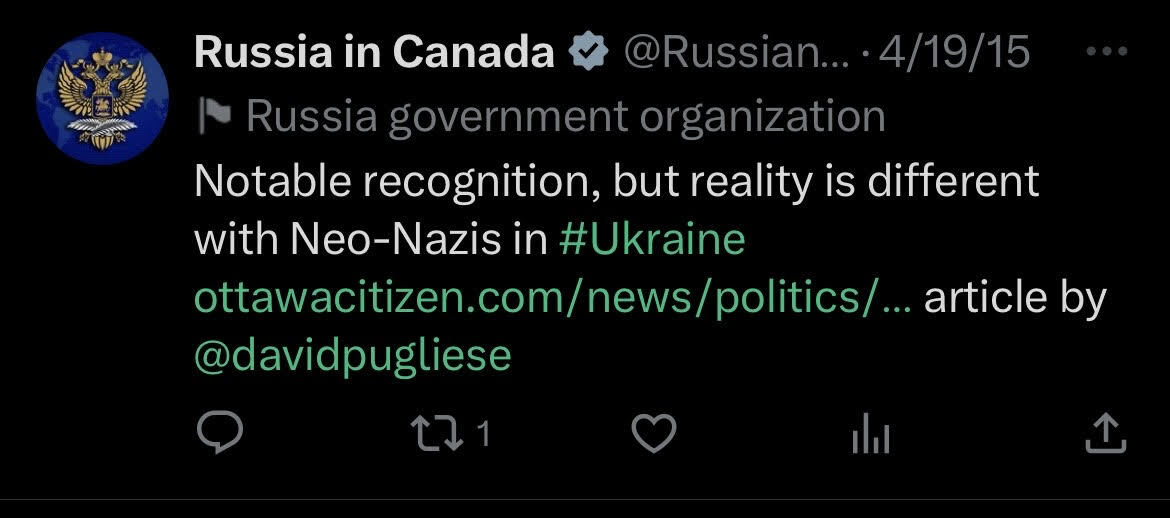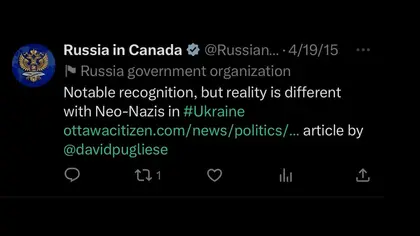David Pugliese, a Canadian who has written for the 169-year-old Ottawa Citizen since 1989, has caught the eye of officials in at least two countries due to his perceived record of running stories that abet the interests of the Russian government.

David Pugliese, Twitter
Referring to Pugliese as an “activist,” a Ukrainian official told the Kyiv Post that he “is known to Ukraine because of his public anti-Ukrainian rhetoric,” which “coincides with Russian propagandist narratives,” adding that Ukraine would consider him to be, writing in all capital letters, “an undesirable person.”
The title of “undesirable person” has no legal ramifications but documents seen by Kyiv Post confirm that Pugliese has been a subject of concern for Ukrainian officials due to his writings which often echo Kremlin talking points.
A former senior Canadian government official, speaking on condition of anonymity, echoed this view, telling the Kyiv Post that in his many years "of having watched how Pugliese works – Pugliese has all the marks of a ‘grey zone’ media operator,” who could be “incentivized and tasked to carry messages and to focus on issues as per Kremlin direction.”
Pugliese, the Ottawa Citizen’s Editor and Deputy Editor, did not respond to multiple requests to discuss this story before it was published.
Known as soft propaganda to media watchers, the official cited a 2017 piece by Pugliese that asserted news of then-Foreign Affairs Minister of Canada’s Chrystia Freeland’s Ukrainian grandfather had actually been a Nazi collaborator during World War II, a narrative that was strongly promoted by the Russian Government.

EU Transfers €1.5 Bln Raised From Russian Assets for Ukraine
News reports at the time indicate that at least one other journalist had first heard of her grandfather’s past from officials at the Russian Embassy. Pugliese, in his own article on the subject, states that evidence of Freeland’s grandfather was available on multiple websites, including pro-Kremlin websites, before the news story broke.
The Canadian official commented that it was not what the deceased grandfather may have done, three quarters of a century before, but rather the timing of the article.
The piece came out within days of Freeland announcing that Ottawa would support Kyiv in its survival against a renewed Russian invasion of the country.
According to experts who spoke to the Kyiv Post, Russian propaganda traditionally uses truthful information, but presents it out of context, or introduces it to a context that is unrelated – such as tropes about 1940s Nazis in Ukraine as a justification for the invasion of the country in 2022.
The story regarding Freeland’s grandfather was further amplified by pro-Moscow news sources, including the Russian Embassy in Canada, which eventually led to the expulsion of four Russian diplomats.
Freeland said that the banished Russian emissaries were “intelligence officers or individuals who have used their diplomatic status to undermine Canada's security or interfere in our democracy.”
Canadian Prime Minister Justin Trudeau, at the time, referred to Russia’s role in promoting the story about Freeland’s grandfather, describing the incident as being “…efforts by Russian propagandists to discredit our minister of foreign affairs, through social media and sharing stories about her.”
Kirill Kalinin, who had run the Russian embassy’s social media platforms and acted as its spokesman, was one of the Russian envoys ejected.
An observer noted that during Kalinin’s tenure in Ottawa, the Russian embassy’s Twitter account, which would have been under his control, tagged Pugliese in Tweets. The embassy has also shared Pugliese’s work on Nazis in Ukraine – something that the Canadian official confirmed had also been noticed by others in Canada.
A review of publicly available Tweets finds that after Kalinin left Canada, the Russian Embassy continued to tag Pugliese, including in the recent past where he has mentioned in an Embassy post that denied the mass torture, rape, and murder of Ukrainian civilians by Russian troops in occupied-Bucha in 2022 – a post from which Pugliese did not remove his name.
Upon being expelled from Ottawa, Kalinin gave an exclusive interview to Pugliese, where he chastised the Canadian government for having made the Russian propagandist persona non grata.
The Ukrainian and Canadian official confirmed that Pugliese’s multiple articles tying Ukraine with Nazism had been noticed since he had Pugliese’s social media usage. Earlier, a 2020 open letter by the Ukrainian Canadian Congress expressed concerns that Pugliese’s reporting was biased and propagated a narrative “originating from the Russian Embassy in Canada.”
One of Kremlin autocrat Vladimir Putin’s numerous reasons for ordering a full-scale invasion of Ukraine was that Nazis were in power even though it had a democratically elected Jewish president and has been defending its territory from the initial Moscow invasion of 2014 when the Crimean Peninsula was forcibly seized.
In one article, Pugliese cites a civil society organization in Ukraine as being upset by the action of Canadian officials. The leader of the group cited by Pugliese had been a member of parliament in the pro-Kremlin faction Opposition-For Life party, which is associated with former President Viktor Yanukovych, who abandoned office during the popular pro-democratic uprising of Maidan.
Yanukovych is considered a fugitive in Ukraine and is wanted for high treason. He is believed to be residing in Russia along with members of his former administration.
Chronologically, The New York Times has reported that Russian disinformation began to ramp-up its use of the terms “Ukraine” and “Nazi” in the weeks surrounding the launch of the full-scale invasion. Since Pugliese first opened his Twitter account in October 2010 until October 2021, he never once published the words “Nazi” and “Ukraine” in the same Tweet.

However, within a year-and-a-half period immediately before the all-out invasion of Ukraine and continuing for a few months into the invasion, Pugliese used the words “Nazi” and “Ukraine” more than two dozen times, which is one of the reasons that some said that they find it hard to believe that his articles and social media posts so often parrot what the Kremlin has been promoting purely by chance.
The Russian government, as the full-scale invasion was beginning, increased the trope about Ukrainian Nazis. Some found Pugliese's own repetition of the trope on social media to be peculiar, in that despite never mentioning "Ukraine" "Nazi" in a single tweet between October 2010 and October 2021. In 2022 alone, he wrote the terms together more than two dozen times, particularly between January and May 2022.
“Glenn Greenwald, Tucker Carlson, and others have been identified by media watchers – but Pugliese has not received the scrutinized attention that he should, as he is a potential risk, since it does appear that he is carrying water for the Kremlin,” said the Canadian official
You can also highlight the text and press Ctrl + Enter






